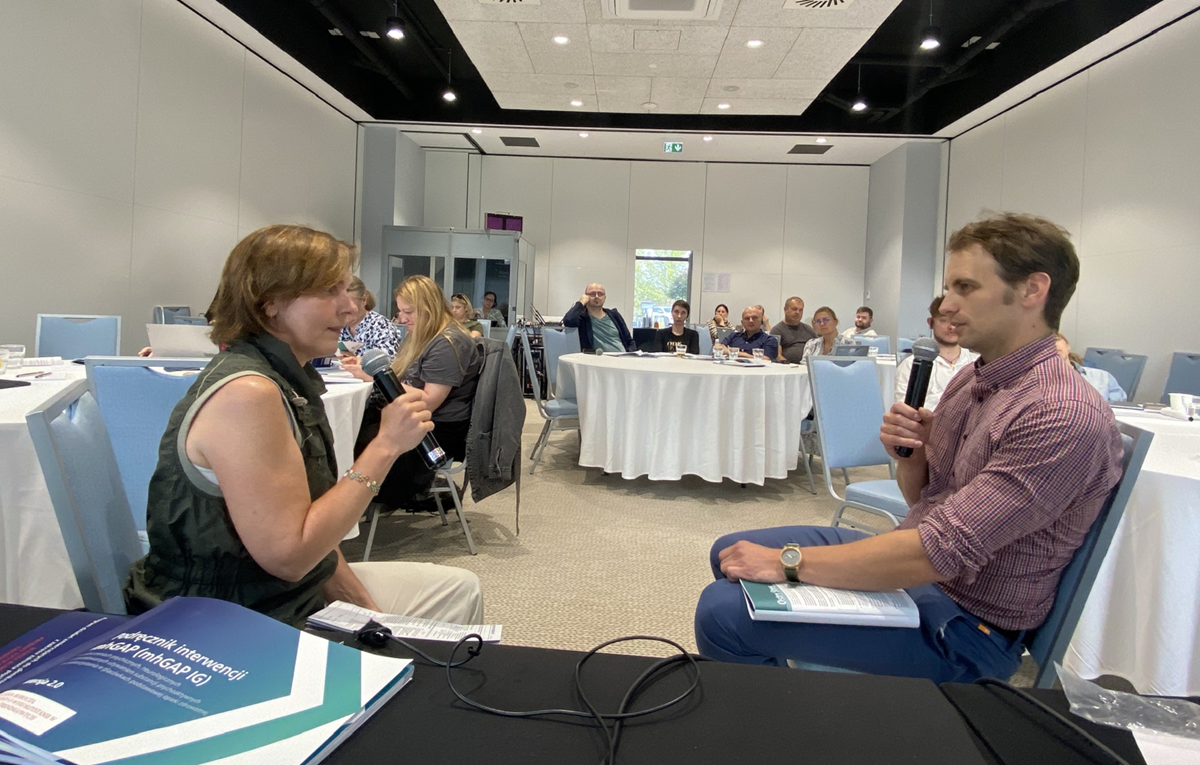
International Forum on Health Investments in Central Asia
Poland has recently implemented the WHO Mental Health Gaps Action Programme (mhGAP), an evidence-based approach to scaling up mental health care capacities and services, as part of its National Health Programme, taking a significant step towards better addressing the unmet mental health needs of its population.
Poland has recently implemented the WHO Mental Health Gaps Action Programme (mhGAP), an evidence-based approach to scaling up mental health care capacities and services, as part of its National Health Programme, taking a significant step towards better addressing the unmet mental health needs of its population.
Poland, like many other countries in the WHO European Region, faces significant challenges in ensuring access to mental health services. Sixty percent of patients who say they need psychological support admit that they do not seek help because of the stigma associated with it. There are only 9 psychiatrists per 100 000 inhabitants in the country and waiting lists are long. Only 3.7% of Poland’s health budget is spent on mental health care – a low share compared to some other countries in the European Region.
Urgent need for better mental health care
Today, Polish children have one of the lowest rates of mental well-being and one of the highest rates of suicide attempts in Europe. In 2022, the police investigated a total of 2,031 suicide attempts in the under-18 age group – an increase of 148% since 2020.
Recognizing the need for urgent change, the Polish government is taking urgent steps to reform the mental health protection system, including for children and young people. Since 2018, the government has quadrupled spending on child and young people’s mental health to over PLN 1 billion (EUR 200 million) to respond to current needs.
“In the past, mental health has not received the same attention as physical health, not only in Poland but across the WHO European Region. We are beginning to see the cost of this inattention for our society, economy, communities and families,” said Dr Nino Berdzuli, WHO Representative in Poland and WHO Special Envoy for the response to the emergency in Ukraine in refugee-hosting countries.
“But the Polish health authorities are now taking action – their current and future plans show that we are on the right track,” added Dr Berdzuli.
Mental health has long been considered a lower priority than physical health in the Region and globally. Stigma and stereotypes about mental health needs, coupled with inadequate resources for mental health services and long waiting lists for treatment, have created significant barriers to access to mental health care in many countries.
Improving access to primary health care
In Poland and across the European Region, primary health care represents the entry point into the health system for patients with health problems.
This is also why integrating mental health care into primary health care is one of the most effective interventions to reduce unmet mental health needs – by identifying people at risk early, conducting a rapid assessment, and enabling referral to appropriate service providers.
“General practitioners need to become frontline actors in community mental health care in Poland, helping to reduce pressure on overstretched mental health services,” said Dr Berdzuli.
The mhGAP programme will equip Polish general practitioners with the knowledge and skills needed to recognise symptoms of common mental health conditions, including depression, stress-related disorders, substance abuse and suicidal thoughts. Specialist training will give them the confidence to treat these conditions or, if necessary, refer patients to psychologists and psychiatrists in community mental health centres.
“This program will bring mental health care closer to the people. It is about giving mental health the attention it deserves,” added Dr. Berdzuli.
Poland is the latest country in the region to implement the mhGAP, joining its neighbour Ukraine, which has also started implementing the tool at national level. More than 100 countries worldwide are already implementing the mhGAP.
“Preparations for the launch of the programme began over a year ago and now we are delighted to announce the launch of the mhGAP programme in Poland. The Ministry of Health is delighted that we have a first pilot group and the skills and knowledge acquired through the programme will be beneficial for the whole country,” said Joanna Głażewska, Deputy Head of the Public Health Authority.
The programme will initially be tested in the Poldaskie and Mazovietskie regions, but there are already plans to introduce the programme nationwide afterwards.
Access is also provided for refugees
The programme will also support Ukrainian refugees. A survey conducted by the Polish Central Statistical Office and the WHO Country Office in Poland found that at least one in ten Ukrainian refugees reported having significant mental health problems, and of those who reported such problems, more than half would benefit from treatment.
“In addition to the Polish population, mental health support is also being extended to the large number of Ukrainian refugees in the country. The mental health and emotional well-being of refugees is a pressing concern, and with the generous financial support of the United States government, WHO and the Polish Ministry of Health have taken proactive steps to address the issue,” explains Dr. Berdzuli.
Mental health is one of the flagship pillars of the European Programme of Work 2020-2025 (EPW), the blueprint that guides much of WHO/Europe’s work. As part of the EPW, WHO/Europe has created the European Mental Health Coalition, which brings together a wide range of key stakeholders to advocate for investment in mental health to governments and policy-makers.

Ethel Purdy – Medical Blogger & Pharmacist
Bridging the world of wellness and science, Ethel Purdy is a professional voice in healthcare with a passion for sharing knowledge. At 36, she stands at the confluence of medical expertise and the written word, holding a pharmacy degree acquired under the rigorous education systems of Germany and Estonia.
Her pursuit of medicine was fueled by a desire to understand the intricacies of human health and to contribute to the community’s understanding of it. Transitioning seamlessly into the realm of blogging, Ethel has found a platform to demystify complex medical concepts for the everyday reader.
Ethel’s commitment to the world of medicine extends beyond her professional life into a personal commitment to health and wellness. Her hobbies reflect this dedication, often involving research on the latest medical advances, participating in wellness communities, and exploring the vast and varied dimensions of health.
Join Ethel as she distills her pharmaceutical knowledge into accessible wisdom, fostering an environment where science meets lifestyle and everyone is invited to learn. Whether you’re looking for insights into the latest health trends or trustworthy medical advice, Ethel’s blog is your gateway to the nexus of healthcare and daily living.



